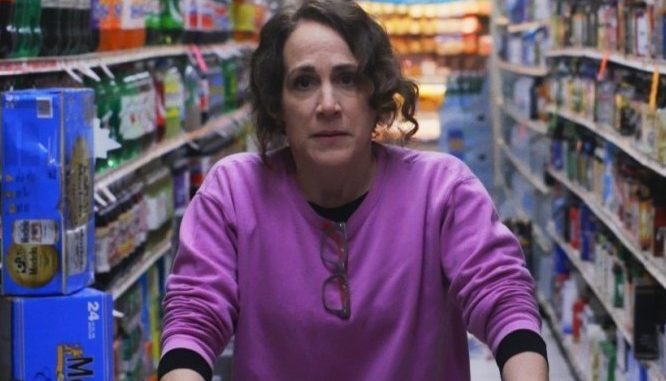
With only a 5 and a half minute run time and a minimalistic setting, director/writer Nick Borenstein manages to convey the troubles of a modern family coping with the psychological rehabilitation of a mother wrought by past addiction troubles all within the confines of a 99 cents store. The casting is brilliant, with the director assuming the role of a Jewish-American son seeking to support his mother, played brilliantly by Kathryn Markey, following her battle with mental illness and alcoholism in modern America. The director makes it clear that his protagonist is openly homosexual and yet Borenstein does not make this the focal point of the plot. Rather, it what goes on within the subtext of the dialogue that propels the exposition forward, delivering a tour de force of screenwriting that breaks cinematic traditions of action in the place of dialogue. But within this momentary glimpse into a struggling family, the film rarely breaks pace with the foreground of each shot.
In essence, 99 feels more like a theatrical play rather than a film and Borenstein conveys more emotion through his writing than any big summer blockbuster film could achieve within the space of a 90-minute run time. Every frame, every momentary pause, and dimly lit candescent lighting backdrop helps to enhance the isolation of this unique family reeling from their tribulations while all along shopping for a cousin’s Barmitzvah party. Such rhythmic jest in the space of mere minutes can only be achieved by a director who understands the significance of substance over style, and this short film symbolizes such cinematic notions.
Cinematography As a Brilliant Metaphor For Modern Society
Besides the writing and acting, one of the key strengths of this film is the work of cinematographer Marc Katz. With the simple use of a handheld camera, Katz sticks with the documentary style of cinema, as each shot is juxtaposed with a succession middle to close up angles that instill in the viewers a sense of isolation in the supermarket. The familial dynamic is never broken by the disruption of a static shot or intricate camera placement, rather, Katz juxtaposes his framing between traditional shot/reverse shot mechanics that evokes the naturalism of a documentary with French cinema verite. As Borenstein and Markey move through the aisles allowing viewers to catch instances of the family’s past, so does the camera shift without ever making its presence known. Much like a stranger eavesdropping in the middle of someone’s else conversation, so does the audience via Katz’s brilliant camera work. 99 places the passivity of the camera in the same hierarchy as the dialogue, both helping the viewer understand the issues this film aspires to tackle.
Borenstein’s film truly is a meditation on life, religion, sexuality, and an expose on the modern American family. Every part of the human polemic is tackled within the space of five minutes, integrating the anguish of this family with the larger American society at large. Borenstein packs his script heavy with dialogue with little cadence to screen direction, as every interaction between the mother and son dynamic resembling a staged monologue. With such a dialogue-heavy work of cinematic narration, Katz still manages to remain unobtrusive in his camera placement. In the end, the singular image of Markey’s character standing alone in the aisle holding on to a shopping cart imbues the audience with the internal isolation felt by the character.
The Verdict
While 99 bucks the trend of being the fast-paced film that most current audiences are used to, it still is entrenched deeply in the emotionality of its characters. Through brilliant cinematography, witty dialogue, and interesting characters, the director puts forth a film that is both humorous and haunting. One simply does watch 99 without wondering what actually transpired before the events of Markey’s character breakdown. Through the screenplay, the director delivers tiny glimpses into a family dynamic that is burdened by a plethora of psychological and emotional setbacks without oversaturating the viewer with a ton of backstory. One understands that Markey visits the 99 cents store often just from her interaction with the clerks that work there, but the plot does not overburden the viewer with this idea. Rather, Borenstein’s script touches upon such character nuances while allowing the audience to piece together the psychological states of its protagonists. Such touches were joyous to behold and lent this film a sense of pathos that few shorts can achieve due to their natural plot restrictions.
In the end, 99 is a brilliant film that combines the elements of writing and cinematic technique into a final product that stands tall as a short film.Â


Leave a Reply